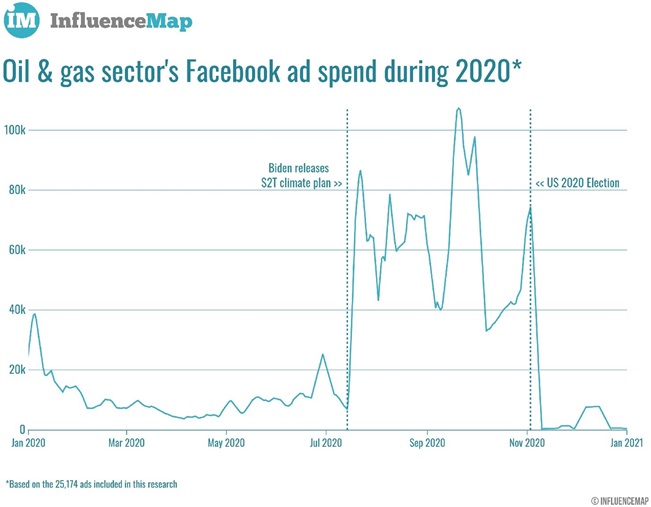Dr. Seema Javed
Oil & gas sector spent $9.6 million on 25,174 ads on Facebook
The oil and gas sector’s Facebook ads designed to prolong the use of fossil fuels were viewed at least 431 million times during 2020, a new analysis by Influence Map shows.
The research focused on ads which ran on Facebook’s United States platform from 25 oil and gas organizations or their advocacy groups, including from the American Petroleum Institute (API), ExxonMobil, Phillips 66, Texas Oil and Gas Association and OneAlaska.
It found 25,174 ads which included messages designed to help lock in a future for oil and gas. The amount spent on these ads was $9.6 million.
ClimateVoice Founder & former Director of Sustainability at Facebook, Bill Weihl, said: “Despite Facebook’s public support for climate action, it continues to allow its platform to be used to spread fossil fuel propaganda. “Not only is Facebook inadequately enforcing its existing advertising policies, it’s clear that these policies are not keeping pace with the critical need for urgent climate action. “If Facebook is serious about its climate commitments, it needs to rethink whether it’s willing to keep taking the money of fossil fuel companies.

The analysis categorized the sector’s highly sophisticated messaging playbook into four major themes: (1) The oil gas industry is part of the climate solution, (2) the pragmatic benefits of oil and gas, (3) the oil and gas industry supports local communities and the economy, and (4) the oil and gas sector is important patriotically for US energy independence. InfluenceMap’s research shows:
- Of the 25,174 ads analyzed, 48% included the narrative that the fossil fuel sector was ‘part of the solution’ to the climate crisis. The 12,140 ads in this category were viewed 122 million times, with youngerusers (25-34 years-old) more likely to be in the target audience.
- Within this category were ads promoting the notion of gas as a ‘clean/green/low carbon’ energy source, despite the IPCC warning that methane has a greenhouse warming effect up to 87 times greater than carbon dioxide over a 20 year period . The largest distributor of these ads was the AmericanPetroleum Institute, which counts ExxonMobil, Chevron, BP, Shell, and others among its members.
- $4.4million was spent highlighting oil and gas as being part of a ‘pragmatic energy mix’. The ads in this category were viewed 174 million times, with the audience skewed towards older age groups and men.
- Thebiggest spender was ExxonMobil ($5.04 million) following by the API ($2.97 million) and
OneAlaska ($330,000).
- Thetop states by ad impressions were Texas (54 million), followed by Alaska (34 million), and
California (27 million).
- Trackingof when these ads were deployed shows a significant spike just after Joe Biden announced his $2 trillion climate plan during the election campaign. This momentum was sustained until the US election in November.
The true number of pro-fossil fuel ads – and therefore the reach of these messages – is likely to be
significantly higher given this research focused on just 25 organizations and their ads on Facebook’s United States platform.
Also Read : Australia to return Indian art collection
Also Read : Concerns grow as Delta outbreak spreads in China
Both the IPCC and the International Energy Agency (IEA) have warned that in order to limit global warming to 1.5C, there needs to be a dramatic shift away from fossil fuels. Accordingly, ads aimed at extending the use of oil and gas are misaligned with the science.
InfluenceMap Program Manager Faye Holder said: “This research reveals the latest iteration of the oil and gas industry’s playbook on climate change.
“Rather than outright climate change denial, the industry is deploying more nuanced messaging including the idea that it is part of the solution to the climate crisis.
“Big oil and gas industry players are using Facebook to try to prolong the use of fossil fuels, which is contrary to what scientists say is needed to combat climate change.”
Part of the research also focused on Facebook’s role in allowing its platform to be used to promote the continued use of fossil fuels.
The social media company has provided the sector with an unprecedented tool to target its messaging playbook at strategically important demographics at politically important moments.
 Jubilee Post News & Views
Jubilee Post News & Views





